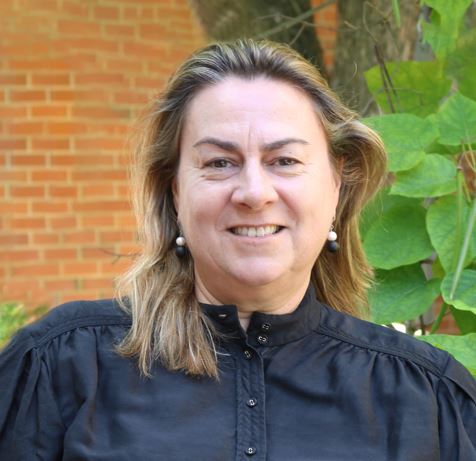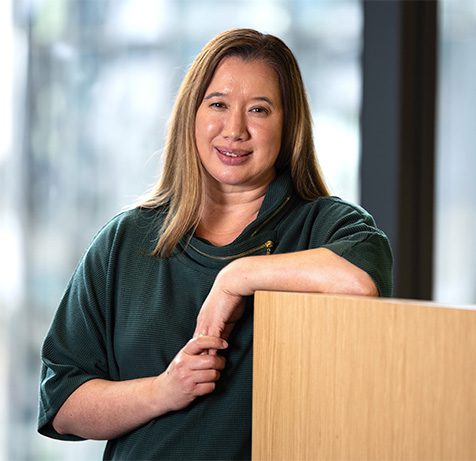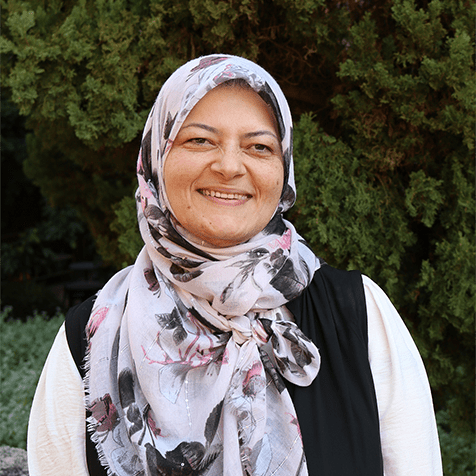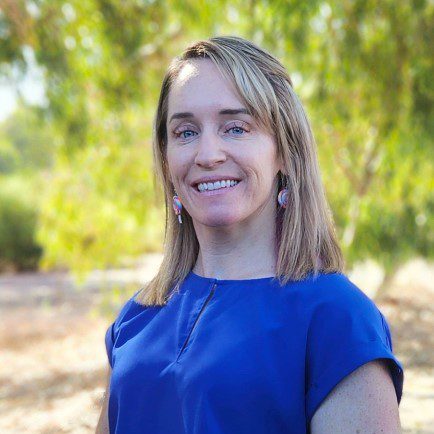About us
Our vision is to work with the MS community to remove the confusion about diet and promote healthy eating among people with MS.
We aim to provide independent, evidence-based research about diet and MS so consumers can feel confident making decisions about their diet.
Our research is built around the need for high-quality evidence on the influence of diet on MS, while ensuring that any findings support the needs and values of people with MS.
Our goals include the development of educational resources and rigorous protocols for diet-related clinical trials.
Meet the team

Professor Lucinda Black
Nutrition Scientist, Registered Nutritionist
Read more

Associate Professor Andrea Begley
Advanced Accredited Practising Dietitian
Read more

Dr Rebecca Russell
Nutrition Lecturer, Registered Nutritionist
Read more
Professor Lucinda Black
Nutrition Scientist, Registered Nutritionist
Institute for Physical Activity and Nutrition (IPAN)
School of Exercise and Nutrition Sciences, Deakin University, Melbourne.
Professor Lucinda Black is a nutrition scientist who focuses on studying the relationship between diet and the risk of onset and progression of MS. She has been working in the field of diet and MS since 2016 and leads the MS Nutrition Research Program across Deakin and Curtin Universities. Her goal is to eliminate the confusion about diet among people with MS by generating high-quality evidence and translating research findings into nutrition resources and tailored education for the MS community. Lucinda is a Registered Nutritionist with the Nutrition Society of Australia.
Lucinda completed her PhD at University College Cork in Ireland in 2012. She has since been awarded over $7 million in grant and fellowship funding as lead investigator. Her funding includes two project grants from the National Health and Medical Research Council (NHMRC), three consecutive fellowships from MSWA and MS Australia, and international funding from the United States National MS Society. To support her research in diet and MS, Lucinda has assembled an international multidisciplinary team of experts, including neurologists and senior researchers, from Australia, the UK, the USA, and Canada.
Associate Professor Andrea Begley
Advanced Accredited Practising Dietitian
Curtin School of Population Health, Curtin University, Perth
Associate Professor Andrea Begley has over 30 years of experience in dietetics research related to improving dietary intakes in communities and populations. Andrea became interested in exploring the role of nutrition in people with MS and their experiences with food, after noticing a lack of research that addressed these areas.
Andrea has previously evaluated the “Food Sensations® for Adults” program, funded by the WA Department of Health. That program aims to enhance food literacy in adults and improve their ability to plan, manage, select, and prepare healthy foods. She has also provided consultation on best practices for obesity and nutrition prevention programs commissioned by the Health Networks Unit and Chronic Disease Prevention Directorate in the WA Department of Health.
Currently, Andrea serves as the Director of Learning and Teaching for the School of Population Health and previously held the role of Discipline Lead for Nutrition and Dietetics at Curtin University. She is credentialed by Dietitians Australia as an Advanced Accredited Practicing Dietitian and has been recognised as a Fellow of the Public Health Association of Australia
Dr Rebecca Russell
Nutrition Lecturer, Registered Nutritionist
Curtin School of Population Health, Curtin University, Perth
Dr Rebecca Russell is a Registered Nutritionist with the Nutrition Society of Australia and a chef with an interest in helping people with MS make healthy food choices. Through her research, Rebecca has worked with the MS community to co-design a nutrition education program tailored to their needs. She tested version 1 of the program, called “Eating Well with MS,” with support from an MS Australia grant and now works as a research assistant to continue working with the MS community to revise the program.
Rebecca is passionate about working with the MS community and was awarded the Consumer and Community Involvement Award at the 2022 Symposium of WA Neuroscience. She was also a finalist in the 2022 ExxonMobil Student Scientist of the Year at the Premier’s Science Awards.
In her spare time, Rebecca uses her chef talents to teach cooking classes at OzHarvest WA, where she turns rescued food into nutritious meals for charities.

Dr Ellie Dunlop
Research Fellow, Accredited Practising Dietitian
Read more

Dr Hajar Mazahery
Research Fellow, Nutrition Scientist
Read more

Dr Barbara Brayner
Research Fellow, Registered Nutritionist
Read more
Dr Ellie Dunlop
Research Fellow, Accredited Practising Dietitian
Institute for Physical Activity and Nutrition (IPAN)
School of Exercise and Nutrition Sciences, Deakin University, Melbourne.
Dr Ellie Dunlop is an Accredited Practising Dietitian with a keen interest in food composition, vitamin D, and the relationship between diet and MS. In 2022, she successfully completed her PhD titled “Investigating dietary vitamin D in Australia,” for which she received a Chancellor’s commendation. Currently, Ellie holds an MS Australia Postdoctoral Research Fellowship, focusing on the role of diet, foods, and nutrients in the onset and progression of paediatric MS.
Ellie recognises that understanding the role of diet in MS empowers individuals to make informed decisions about their diet, promoting not only better outcomes for MS but also for improved overall health.
Dr Hajar Mazahery
Research Fellow, Registered Nutritionist
Curtin School of Population Health, Curtin University, Perth
Dr Hajar Mazahery is an experienced nutrition scientist with a keen interest in dietary assessment, vitamin D, omega-3, and the impact of diet on mental health and neurodevelopmental disorders. She applies her expertise in nutrition, dietary assessment, and research to investigate the role of diet, food, and nutrients in the onset and progression of MS. Hajar firmly believes in the numerous benefits that a healthy diet can bring to people’s lives, with a particular emphasis on its importance for those living with MS.
Hajar’s research has underscored the significance of vitamin D and omega-3 in relation to neurodevelopmental disorders. Her study on vitamin D and omega-3 in autism spectrum disorder, conducted at Massey University in Auckland, New Zealand, revealed potential benefits of vitamin D and omega-3 supplementation for children with autism spectrum disorder. Furthermore, the research suggested that vitamin D may be more effective in children with higher baseline inflammation, thus highlighting the immunomodulatory properties of vitamin D. These findings provide crucial evidence for future research and the implementation of dietary interventions for conditions with an inflammatory component, including MS.
Dr Barbara Brayner
Research Fellow, Registered Nutritionist
Institute for Physical Activity and Nutrition (IPAN)
School of Exercise and Nutrition Sciences, Deakin University, Melbourne.
Dr Barbara Brayner is a Registered Nutritionist interested in understanding the impacts of different dietary patterns and MS. She completed her PhD in 2023 and now works as a Postdoctoral Research Fellow. Her research focuses specifically on how different dietary fats within an overall healthy dietary pattern can impact MS onset and progression.
Barbara is passionate about understanding the impact of diet on MS onset and progression, helping people to make informed decisions that will ultimately impact their health.

Dr Priscila Machado
Research Fellow, Nutrition Scientist
Read more

Xiaochen (Grace) Qu
PhD student, Associate Nutritionist
Read more
Dr Priscila Machado
Research Fellow, Nutrition Scientist
Institute for Physical Activity and Nutrition (IPAN)
School of Exercise and Nutrition Sciences, Deakin University, Melbourne
Dr Priscila Machado is a Nutrition Scientist with an interest in understanding the impacts of ultra-processed foods on MS. She holds a PhD in Public Health Nutrition from the University of Sao Paulo, Brazil (2019). Her research involves assessing diet quality, nutritional status, and health outcomes among adults and children in several countries. Priscila is an expert advisor for the World Health Organization (WHO) and UNICEF Technical Expert Advisory group on nutrition Monitoring (TEAM), and she has contributed her expertise on ultra-processed foods as a co-author for several United Nations’ reports.
Priscila is passionate about understanding the impacts of diet on MS onset and progression, supporting people in making healthier food choices, and exploring how governments can create healthier environments that promote people’s health and wellbeing.
Xiaochen (Grace) Qu
PhD student, Associate Nutritionist
Curtin School of Population Health, Curtin University, Perth
Grace is analysing data from an Australian study of people with MS to uncover the relationship between specific diets, foods, nutrients, and the progression of MS. She hopes to improve our understanding of the role of diet in MS progression.
Grace has a strong passion for public health and nutrition. She completed her Bachelor’s degree in food science at China Agricultural University, followed by a Master’s degree at Wageningen University in the Netherlands, which is renowned globally for its nutrition department.
During her Master’s degree, Grace acquired a solid foundation in nutritional epidemiology, equipping her with the necessary skills to design and analyse dietary data from observational studies. She now applies these skills to researching the role of diet in MS. Grace is professionally recognised as an Associate Nutritionist with the Nutrition Society of Australia.

Professor Lucinda Black
Nutrition Scientist, Registered Nutritionist
Read more
Professor Lucinda Black
Nutrition Scientist, Registered Nutritionist
Institute for Physical Activity and Nutrition (IPAN)
School of Exercise and Nutrition Sciences, Deakin University, Melbourne.
Professor Lucinda Black is a nutrition scientist who focuses on studying the relationship between diet and the risk of onset and progression of MS. She has been working in the field of diet and MS since 2016 and leads the MS Nutrition Research Program at Deakin University. Her goal is to eliminate the confusion about diet among people with MS by generating high-quality evidence and translating research findings into nutrition resources and tailored education for the MS community. Lucinda is a Registered Nutritionist with the Nutrition Society of Australia.
Lucinda completed her PhD at University College Cork in Ireland in 2012. She has since been awarded over $6 million in grant and fellowship funding as lead investigator. Her funding includes two project grants from the National Health and Medical Research Council (NHMRC) and three consecutive fellowships from MSWA and MS Australia. To support her research in diet and MS, Lucinda has assembled an international multidisciplinary team of experts, including neurologists and senior researchers, from Australia, the UK, the USA, and Canada.
Professor Lucinda Black
Nutrition Scientist, Registered Nutritionist
Institute for Physical Activity and Nutrition (IPAN)
School of Exercise and Nutrition Sciences, Deakin University, Melbourne.
Professor Lucinda Black is a nutrition scientist who focuses on studying the relationship between diet and the risk of onset and progression of MS. She has been working in the field of diet and MS since 2016 and leads the MS Nutrition Research Program at Deakin University. Her goal is to eliminate the confusion about diet among people with MS by generating high-quality evidence and translating research findings into nutrition resources and tailored education for the MS community. Lucinda is a Registered Nutritionist with the Nutrition Society of Australia.
Lucinda completed her PhD at University College Cork in Ireland in 2012. She has since been awarded over $6 million in grant and fellowship funding as lead investigator. Her funding includes two project grants from the National Health and Medical Research Council (NHMRC) and three consecutive fellowships from MSWA and MS Australia. To support her research in diet and MS, Lucinda has assembled an international multidisciplinary team of experts, including neurologists and senior researchers, from Australia, the UK, the USA, and Canada.

Associate Professor Andrea Begley
Advanced Accredited Practising Dietitian
Read more
Associate Professor Andrea Begley
Advanced Accredited Practising Dietitian
Curtin School of Population Health, Curtin University, Perth
Associate Professor Andrea Begley has over 30 years of experience in dietetics research related to improving dietary intakes in communities and populations. Andrea became interested in exploring the role of nutrition in the diagnosis of people with MS and their experiences with food, after noticing a lack of research that addressed these areas.
Andrea has previously evaluated the “Food Sensations® for Adults” program, funded by the WA Department of Health. That program aims to enhance food literacy in adults and improve their ability to plan, manage, select, and prepare healthy foods. She has also provided consultation on best practices for obesity and nutrition prevention programs commissioned by the Health Networks Unit and Chronic Disease Prevention Directorate in the WA Department of Health.
Currently, Andrea serves as the Director of Learning and Teaching for the School of Population Health and previously held the role of Discipline Lead for Nutrition and Dietetics at Curtin University. She is credentialed by Dietitians Australia as an Advanced Accredited Practicing Dietitian and has been recognised as a Fellow of the Public Health Association of Australia
Professor Lucinda Black
Nutrition Epidemiologist, Registered Nutritionist
Institute for Physical Activity and Nutrition (IPAN)
School of Exercise and Nutrition Sciences, Deakin University, Melbourne.
Professor Lucinda Black is a nutrition epidemiologist who focuses on studying the relationship between diet and the risk of onset and progression of MS. She has been working in the field of diet and MS since 2016 and leads the MS Nutrition Research Program at Deakin University. Her goal is to eliminate the confusion about diet among people with MS by generating high-quality evidence and translating research findings into nutrition resources and tailored education for the MS community. Lucinda is a Registered Nutritionist with the Nutrition Society of Australia.
Lucinda completed her PhD at University College Cork in Ireland in 2012. She has since been awarded over $6 million in grant and fellowship funding as lead investigator. Her funding includes two project grants from the National Health and Medical Research Council (NHMRC) and three consecutive fellowships from MSWA and MS Australia. To support her research in diet and MS, Lucinda has assembled an international multidisciplinary team of experts, including neurologists and senior researchers, from Australia, the UK, the USA, and Canada.

Dr Rebecca Russell
Nutrition Lecturer, Registered Nutritionist
Read more
Dr Rebecca Russell
Nutrition Lecturer, Registered Nutritionist
Curtin School of Population Health, Curtin University, Perth
Dr Rebecca Russell is a Registered Nutritionist with the Nutrition Society of Australia and a chef with an interest in helping people with MS make healthy food choices. Through her research, Rebecca has worked with the MS community to co-design a nutrition education program tailored to their needs. She tested version 1 of the program, called “Eating Well with MS,” with support from an MS Australia grant and now works as a research assistant to continue working with the MS community to revise the program.
Rebecca is passionate about working with the MS community and was awarded the Consumer and Community Involvement Award at the 2022 Symposium of WA Neuroscience. She was also a finalist in the 2022 ExxonMobil Student Scientist of the Year at the Premier’s Science Awards.
In her spare time, Rebecca uses her chef talents to teach cooking classes at OzHarvest WA, where she turns rescued food into nutritious meals for charities.
Professor Lucinda Black
Nutrition Epidemiologist, Registered Nutritionist
Institute for Physical Activity and Nutrition (IPAN)
School of Exercise and Nutrition Sciences, Deakin University, Melbourne.
Professor Lucinda Black is a nutrition epidemiologist who focuses on studying the relationship between diet and the risk of onset and progression of MS. She has been working in the field of diet and MS since 2016 and leads the MS Nutrition Research Program at Deakin University. Her goal is to eliminate the confusion about diet among people with MS by generating high-quality evidence and translating research findings into nutrition resources and tailored education for the MS community. Lucinda is a Registered Nutritionist with the Nutrition Society of Australia.
Lucinda completed her PhD at University College Cork in Ireland in 2012. She has since been awarded over $6 million in grant and fellowship funding as lead investigator. Her funding includes two project grants from the National Health and Medical Research Council (NHMRC) and three consecutive fellowships from MSWA and MS Australia. To support her research in diet and MS, Lucinda has assembled an international multidisciplinary team of experts, including neurologists and senior researchers, from Australia, the UK, the USA, and Canada.

Dr Ellie Dunlop
Research Fellow, Accredited Practising Dietitian
Read more
Dr Ellie Dunlop
Research Fellow, Accredited Practising Dietitian
School of Exercise and Nutrition Sciences, Deakin University, Melbourne.
Dr Ellie Dunlop is an Accredited Practising Dietitian with a keen interest in food composition, vitamin D, and the relationship between diet and MS. In 2022, she successfully completed her PhD titled “Investigating dietary vitamin D in Australia,” for which she received a Chancellor’s commendation. Currently, Ellie holds an MS Australia Postdoctoral Research Fellowship, focusing on the role of diet, foods, and nutrients in the onset and progression of paediatric MS.
Ellie recognises that understanding the role of diet in MS empowers individuals to make informed decisions about their diet, promoting not only better outcomes for MS but also for improved overall health.
Professor Lucinda Black
Nutrition Epidemiologist, Registered Nutritionist
Institute for Physical Activity and Nutrition (IPAN)
School of Exercise and Nutrition Sciences, Deakin University, Melbourne.
Professor Lucinda Black is a nutrition epidemiologist who focuses on studying the relationship between diet and the risk of onset and progression of MS. She has been working in the field of diet and MS since 2016 and leads the MS Nutrition Research Program at Deakin University. Her goal is to eliminate the confusion about diet among people with MS by generating high-quality evidence and translating research findings into nutrition resources and tailored education for the MS community. Lucinda is a Registered Nutritionist with the Nutrition Society of Australia.
Lucinda completed her PhD at University College Cork in Ireland in 2012. She has since been awarded over $6 million in grant and fellowship funding as lead investigator. Her funding includes two project grants from the National Health and Medical Research Council (NHMRC) and three consecutive fellowships from MSWA and MS Australia. To support her research in diet and MS, Lucinda has assembled an international multidisciplinary team of experts, including neurologists and senior researchers, from Australia, the UK, the USA, and Canada.

Dr Hajar Mazahery
Research Fellow, Nutrition Scientist
Read more
Dr Hajar Mazahery
Research Fellow, Nutrition Scientist
Curtin School of Population Health, Curtin University, Perth
Dr Hajar Mazahery is an experienced nutrition scientist with a keen interest in dietary assessment, vitamin D, omega-3, and the impact of diet on mental health and neurodevelopmental disorders. She applies her expertise in nutrition, dietary assessment, and research to investigate the role of diet, food, and nutrients in the onset and progression of MS. Hajar firmly believes in the numerous benefits that a healthy diet can bring to people’s lives, with a particular emphasis on its importance for those living with MS.
Hajar’s research has underscored the significance of vitamin D and omega-3 in relation to neurodevelopmental disorders. Her study on vitamin D and omega-3 in autism spectrum disorder, conducted at Massey University in Auckland, New Zealand, revealed potential benefits of vitamin D and omega-3 supplementation for children with autism spectrum disorder. Furthermore, the research suggested that vitamin D may be more effective in children with higher baseline inflammation, thus highlighting the immunomodulatory properties of vitamin D. These findings provide crucial evidence for future research and the implementation of dietary interventions for conditions with an inflammatory component, including MS.
Professor Lucinda Black
Nutrition Epidemiologist, Registered Nutritionist
Institute for Physical Activity and Nutrition (IPAN)
School of Exercise and Nutrition Sciences, Deakin University, Melbourne.
Professor Lucinda Black is a nutrition epidemiologist who focuses on studying the relationship between diet and the risk of onset and progression of MS. She has been working in the field of diet and MS since 2016 and leads the MS Nutrition Research Program at Deakin University. Her goal is to eliminate the confusion about diet among people with MS by generating high-quality evidence and translating research findings into nutrition resources and tailored education for the MS community. Lucinda is a Registered Nutritionist with the Nutrition Society of Australia.
Lucinda completed her PhD at University College Cork in Ireland in 2012. She has since been awarded over $6 million in grant and fellowship funding as lead investigator. Her funding includes two project grants from the National Health and Medical Research Council (NHMRC) and three consecutive fellowships from MSWA and MS Australia. To support her research in diet and MS, Lucinda has assembled an international multidisciplinary team of experts, including neurologists and senior researchers, from Australia, the UK, the USA, and Canada.

Dr Barbara Brayner
Research Fellow, Registered Nutritionist
Read more
Dr Barbara Brayner
Research Fellow, Registered Nutritionist
Institute for Physical Activity and Nutrition (IPAN)
School of Exercise and Nutrition Sciences, Deakin University, Melbourne.
Dr Barbara Brayner is a Registered Nutritionist interested in understanding the impacts of different dietary patterns and MS. She completed her PhD in 2023 and now works as a Postdoctoral Research Fellow. Her research focuses specifically on how different dietary fats within an overall healthy dietary pattern can impact MS onset and progression.
Barbara is passionate about understanding the impact of diet on MS onset and progression, helping people to make informed decisions that will ultimately impact their health.
Professor Lucinda Black
Nutrition Epidemiologist, Registered Nutritionist
Institute for Physical Activity and Nutrition (IPAN)
School of Exercise and Nutrition Sciences, Deakin University, Melbourne.
Professor Lucinda Black is a nutrition epidemiologist who focuses on studying the relationship between diet and the risk of onset and progression of MS. She has been working in the field of diet and MS since 2016 and leads the MS Nutrition Research Program at Deakin University. Her goal is to eliminate the confusion about diet among people with MS by generating high-quality evidence and translating research findings into nutrition resources and tailored education for the MS community. Lucinda is a Registered Nutritionist with the Nutrition Society of Australia.
Lucinda completed her PhD at University College Cork in Ireland in 2012. She has since been awarded over $6 million in grant and fellowship funding as lead investigator. Her funding includes two project grants from the National Health and Medical Research Council (NHMRC) and three consecutive fellowships from MSWA and MS Australia. To support her research in diet and MS, Lucinda has assembled an international multidisciplinary team of experts, including neurologists and senior researchers, from Australia, the UK, the USA, and Canada.

Dr Priscila Machado
Research Fellow, Nutrition Scientist
Read more
Dr Priscila Machado
Research Fellow, Nutrition Scientist
Institute for Physical Activity and Nutrition (IPAN)
School of Exercise and Nutrition Sciences, Deakin University, Melbourne.
Dr Priscila Machado is a Nutrition Scientist with an interest in understanding the impacts of ultra-processed foods on MS. She holds a PhD in Public Health Nutrition from the University of Sao Paulo, Brazil (2019). Her research involves assessing diet quality, nutritional status, and health outcomes among adults and children in several countries. Priscila is an expert advisor for the World Health Organization (WHO) and UNICEF Technical Expert Advisory group on nutrition Monitoring (TEAM), and she has contributed her expertise on ultra-processed foods as a co-author for several United Nations’ reports.
Priscila is passionate about understanding the impacts of diet on MS onset and progression, supporting people in making healthier food choices, and exploring how governments can create healthier environments that promote people’s health and wellbeing.
Dr Priscila Machado
Research Fellow, Nutrition Scientist
Institute for Physical Activity and Nutrition (IPAN)
School of Exercise and Nutrition Sciences, Deakin University, Melbourne.
Dr Priscila Machado is a Nutrition Scientist with an interest in understanding the impacts of ultra-processed foods on MS. She holds a PhD in Public Health Nutrition from the University of Sao Paulo, Brazil (2019). Her research involves assessing diet quality, nutritional status, and health outcomes among adults and children in several countries. Priscila is an expert advisor for the World Health Organization (WHO) and UNICEF Technical Expert Advisory group on nutrition Monitoring (TEAM), and she has contributed her expertise on ultra-processed foods as a co-author for several United Nations’ reports.
Priscila is passionate about understanding the impacts of diet on MS onset and progression, supporting people in making healthier food choices, and exploring how governments can create healthier environments that promote people’s health and wellbeing.

Xiaochen (Grace) Qu
PhD student, Associate Nutritionist
Read more
Xiaochen (Grace) Qu
PhD student, Associate Nutritionist
Curtin School of Population Health, Curtin University, Perth
Grace is analysing data from an Australian study of people with MS to uncover the relationship between specific diets, foods, nutrients, and the progression of MS. She hopes to improve our understanding of the role of diet in MS progression.
Grace has a strong passion for public health and nutrition. She completed her Bachelor’s degree in food science at China Agricultural University, followed by a Master’s degree at Wageningen University in the Netherlands, which is renowned globally for its nutrition department.
During her Master’s degree, Grace acquired a solid foundation in nutritional epidemiology, equipping her with the necessary skills to design and analyse dietary data from observational studies. She now applies these skills to researching the role of diet in MS. Grace is professionally recognised as an Associate Nutritionist with the Nutrition Society of Australia.
Professor Lucinda Black
Nutritional Epidemiologist, Registered Nutritionist
Institute for Physical Activity and Nutrition (IPAN)
School of Exercise and Nutrition Sciences, Deakin University, Melbourne.
Professor Lucinda Black is a nutritional epidemiologist who focuses on studying the relationship between diet and the risk of onset and progression of MS. She has been working in the field of diet and MS since 2016 and leads the MS Nutrition Research Program at Deakin University. Her goal is to eliminate the confusion about diet among people with MS by generating high-quality evidence and translating research findings into nutrition resources and tailored education for the MS community. Lucinda is a Registered Nutritionist with the Nutrition Society of Australia.
Lucinda completed her PhD at University College Cork in Ireland in 2012. She has since been awarded over $6 million in grant and fellowship funding as lead investigator. Her funding includes two project grants from the National Health and Medical Research Council (NHMRC) and three consecutive fellowships from MSWA and MS Australia. To support her research in diet and MS, Lucinda has assembled an international multidisciplinary team of experts, including neurologists and senior researchers, from Australia, the UK, the USA, and Canada.
